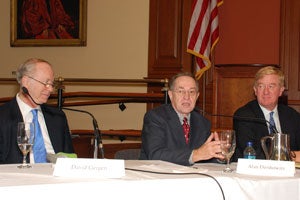After an election that mobilized legions of diverse voters, what can be expected from the 44th president? Three weeks after the victory of Barack Obama ’91, panelists considered the question at an event moderated by Professor Charles Ogletree ’78, director of the Charles Hamilton Houston Institute for Race and Justice. Watch the Webcast.
David Gergen ’67, professor at the Harvard Kennedy School and CNN political commentator, said Obama “has surprised us continuously on the up side” and now there’s a danger of excessive expectation. “If in the same week you appear in Time Magazine as FDR and you appear in Newsweek as Lincoln, the expectations are pretty high.”
Professor Lani Guinier said she saw a different danger. She praised Obama’s phenomenal talents, calling him “someone who is brilliant, strategic and visionary as well as practical and temperamentally calm.” The danger, she said, “Is that too many of us could think we can defer to Barack Obama and his talents to take us where we need to go.” She called the election “a triumph of participatory democracy.” And from her point of view, the challenge now is “how do we not just enable him to do what he wants but hold him accountable for what we want. … We can’t just defer to him and his very competent team of people.”
When asked what Obama’s responsibility is to the diverse groups who elected him, Professor Alan Dershowitz’s answer was succinct: “Zero.”
“He doesn’t owe any one group who helped him get elected,” Dershowitz said. ”His obligation is to the future not the past.”
Ogletree asked whether, when it came to appointments, “there is a reasonable expectation that the cabinet and the Supreme Court should look like the people who got him elected?”
Dershowitz said Obama “should pick his people the way a sick person would pick an oncologist or cardiologist. It should be entirely on the merits. He’s proved that if you really pick on the merits you will get a diverse group.”
Gergen said, with all of the challenges facing our country, it was “critically important to go for talent in making appointments.” But in doing so, Obama should be respectful of factors such as race and gender. Hillary Clinton, he said, would make an excellent choice for secretary of state. “I wouldn’t choose her because she’s a woman, but it helps that she’s a woman.”
Guinier said Obama should try to assure that he has a diverse team so as to have access “to as many minds as possible.” She clarified that she was not talking about identity politics. “When you are constructing a cabinet, it’s not the person’s physical identity per se, it’s not their symbolic identity; it’s really, can this person bring to the table alternative sources of information that the leader of the team is not personally in touch with.”
Panelists also discussed whether after the election of the first black president we are now living in a post-racial era. María Teresa Petersen, executive director of the youth organization, Voto Latino, said to draw that conclusion would be a big mistake. She cited rising incidences of violence against Latinos in the U.S., saying 65 percent of hate crimes were committed against Latinos in the U.S. last year according to an FBI statistic. “We need to have some hard conversations.”
Orlando Patterson, professor of sociology at Harvard University, said Obama’s victory represents a triumph of assimilation in America at a time when, in some ways, “America is more segregated than it was in the seventies.” Patterson believes that assimilation is the way to “help black Americans solve their problems,” and wondered whether Obama will use the bully pulpit to promote it.
Ogletree also asked panelists to discuss whether Alaska Governor Sarah Palin is the future of the Republican party. Former Massachusetts Governor William Weld ’70, a Republican who endorsed Obama, thinks she has staying power. Gergen said he was “sick of talking about Sarah Palin. … There is an honorable intellectual tradition represented by conservatism, and I think she represents the other side of the moon from that.”
Douglas Blackmon, Atlanta bureau chief at the Wall Street Journal, said he believes Palin should not be dismissed, that she has talents and abilities that will likely appeal to certain constituencies. But he warned it would “be the end of the Republican Party as we know it.”
Dershowitz said one of the many reasons it’s essential for Obama to get the country out of the financial crisis is that “desperate times produce extremism.” He suggested that if the U.S. was to go into a terrible recession, someone like Sarah Palin could rise to the top.
“This is going to be a big test for Obama as to whether he can lead us through this crisis in a subtle way at the same time as he moves us center left instead of moving us towards extremes. Both extreme-left and extreme-right are equally dangerous,” Dershowitz said. “I think Obama can keep us in the center.”
